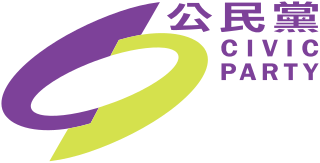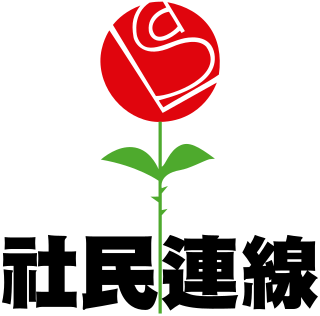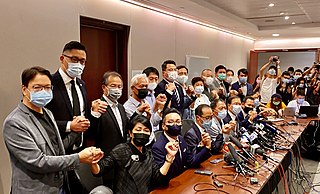
The Democratic Party (DP) is a centre-left liberal political party in Hong Kong. Chaired by Lo Kin-hei, it is the flagship party in the pro-democracy camp and currently has seven elected representatives in the District Councils.

Rita Fan Hsu Lai-tai is a senior Hong Kong politician. She was the first President of the Hong Kong SAR Legislative Council from 1998 to 2008 and a member of the Standing Committee of the National People's Congress (NPCSC).

The pro-democracy camp, also known as the pan-democracy camp, is a political alignment in Hong Kong that supports increased democracy, namely the universal suffrage of the Chief Executive and the Legislative Council as given by the Basic Law under the "One Country, Two Systems" framework.

Leung Yiu-chung is a Hong Kong politician. He is a member of the pro-labour Neighbourhood and Worker's Service Centre, which is a part of the pan-democracy camp. He has had a long-standing tenure as a member of the Legislative Council of Hong Kong. Between 1998 and 2016, he represented the New Territories West geographical constituency, and from 2016 to 2020, he represented the District Council (Second) functional constituency. Leung has also served as a member of the Kwai Tsing District Council since 1985.

The Civic Party (CP) was a pro-democracy liberal political party in Hong Kong.

The League of Social Democrats (LSD) is a social democratic party in Hong Kong. Chaired by Chan Po-ying, wife of Leung Kwok-hung, it positions itself as the radical wing of the pro-democracy camp and stresses on "street actions" and "parliamentary struggles". It currently holds two seats in the District Councils.

The Co-operative Resources Centre was a short-lived political group in the Legislative Council of Hong Kong (LegCo). Led by the Senior Unofficial Member of the Executive and Legislative Councils Allen Lee, it was established on 12 December 1991 by a group of 21 appointed and indirectly elected Legislative Council members from the functional constituencies. It became the largest conservative faction in the legislature countering the pro-democracy United Democrats of Hong Kong (UDHK) won a landslide victory in the first direct Legislative Council election in 1991. In 1993, it was transformed into the Liberal Party.

Meeting Point was a liberal political organisation and party in Hong Kong formed by a group of former student activists in the 1970s and intellectuals for the discussion for the Sino-British negotiation on the question of Hong Kong prospect in 1983. It was one of the earliest groups in Hong Kong that favoured Chinese sovereignty over Hong Kong but wanted a free, democratic and autonomous Hong Kong.

The Fifth Legislative Council of Hong Kong was the fifth meeting of the legislative branch of the Hong Kong Special Administrative Region Government. The membership of the LegCo is based on the 2012 election. The term of the session is from 1 October 2012 to 30 September 2016, during the term in office of the Chief Executive Leung Chun-ying. Due to the new arrangements agreed in a contentious LegCo vote in 2010, the session consists of the new total of 70 seats in LegCo, ten more than previously, with 35 members elected in geographical constituencies through direct elections, and 35 members in functional constituencies, in which five District Council (Second) functional constituency seats each represent all 18 District councils of Hong Kong voted for by all resident voters in Hong Kong. The Democratic Alliance for the Betterment and Progress of Hong Kong remained the largest party while the pan-democrats secured the one-third crucial minority. Notable new members of the LegCo members include Gary Fan from the new established party Neo Democrats and first openly gay councillor, People Power's Ray Chan Chi-chuen.

The Fourth Legislative Council of Hong Kong was the fourth meeting of the legislative branch of the Hong Kong Special Administrative Region Government. The membership of the LegCo is based on the 2008 election. The term of the session is from 1 October 2008 to 30 September 2012, during the second half of the Donald Tsang's administration and first two months of the Leung Chun-ying's term in office. The meeting place was moved from the Legislative Council Building to the new built Legislative Council Complex in 2011. The Democratic Alliance for the Betterment and Progress of Hong Kong remained the largest party with 10 seats. Notable newcomers to the Legislative Council included Regina Ip, Priscilla Leung, Wong Yuk-man, Tanya Chan, and Paul Tse.

The Third Legislative Council of Hong Kong was the meeting of the legislative branch of the Hong Kong Special Administrative Region Government. The membership of the LegCo is based on the 2004 election. The term of the session was from 1 October 2004 to 30 September 2008, during the second half of the Tung Chee-hwa's administration until his resignation in 2005 and was replaced by Donald Tsang for the rest of the term, and also the beginning of the third term of Chief Executive after Tsang won in the 2007 Election. The Democratic Alliance for the Betterment of Hong Kong (DAB) became the largest party with 10 seats. Notable newcomers to the Legislative Council included Leung Kwok-hung, Alan Leong, Ronny Tong, Albert Cheng, and Jeffrey Lam.

The 2016 Hong Kong Legislative Council election was held on 4 September 2016 for the 6th Legislative Council of Hong Kong (LegCo). A total of 70 members, 35 from geographical constituencies (GCs) and 35 from functional constituencies (FCs), were returned. The election came after the rejection of the 2016/2017 constitutional reform proposals which suggested the electoral method for the 2016 Legislative Council remains unchanged.

The 2016 New Territories East by-election was held on 28 February 2016 after the incumbent Legislative Councillor Ronny Tong Ka-wah of New Territories East quit the Civic Party and resigned from the Legislative Council of Hong Kong (LegCo), effective on 1 October 2015.

The 2016 Election Committee subsector elections were held on 11 December 2016 for 1,034 of the 1,200 members of the Election Committee (EC) which is responsible for electing the Chief Executive of Hong Kong (CE) in the 2017 election.
The election for the Hong Kong deputies to the 13th National People's Congress (NPC) was held on 19 December 2017. 36 Hong Kong deputies were elected by an electoral college composed of 1,989 members.

On 11 November 2020, 15 Hong Kong pro-democracy members of the Legislative Council announced their resignations in protest against the decision of the National People's Congress Standing Committee (NPCSC) which bars Legislative Council members from supporting Hong Kong independence, refusing to recognise Beijing's sovereignty over Hong Kong, seeking help from "foreign countries or foreign forces to interfere in the affairs of the region" or committing "other acts that endanger national security" that resulted in the disqualification of pro-democracy legislators Alvin Yeung, Dennis Kwok, Kwok Ka-ki and Kenneth Leung. In July 2020, the four had been barred from running in the subsequently postponed Legislative Council election originally scheduled for September 2020. The resignation en masse left the Legislative Council membership dwindled to 43 out of the total number of 70 seats, with virtually no opposition for the first time since the 1997 handover.
The election for the President of the Third Legislative Council took place on 6 October 2004 for members of the 3rd Legislative Council of Hong Kong to among themselves elect the President of the Legislative Council of Hong Kong for the duration of the council. Rita Fan from the pro-Beijing camp defeated Albert Ho, a democrat, and was re-elected as widely expected.
The election for the President of the Second Legislative Council took place on 4 October 2000 for members of the 2nd Legislative Council of Hong Kong to among themselves elect the President of the Legislative Council of Hong Kong for the duration of the council. Rita Fan from the pro-Beijing camp defeated former President Andrew Wong and was re-elected.
The election for the President of the Provisional Legislative Council took place on 25 January 1997 for members of the Provisional Legislative Council of Hong Kong to among themselves elect the President for the duration of the council. Rita Fan from the pro-Beijing camp defeated President of the colonial Legislative Council Andrew Wong and was elected.














